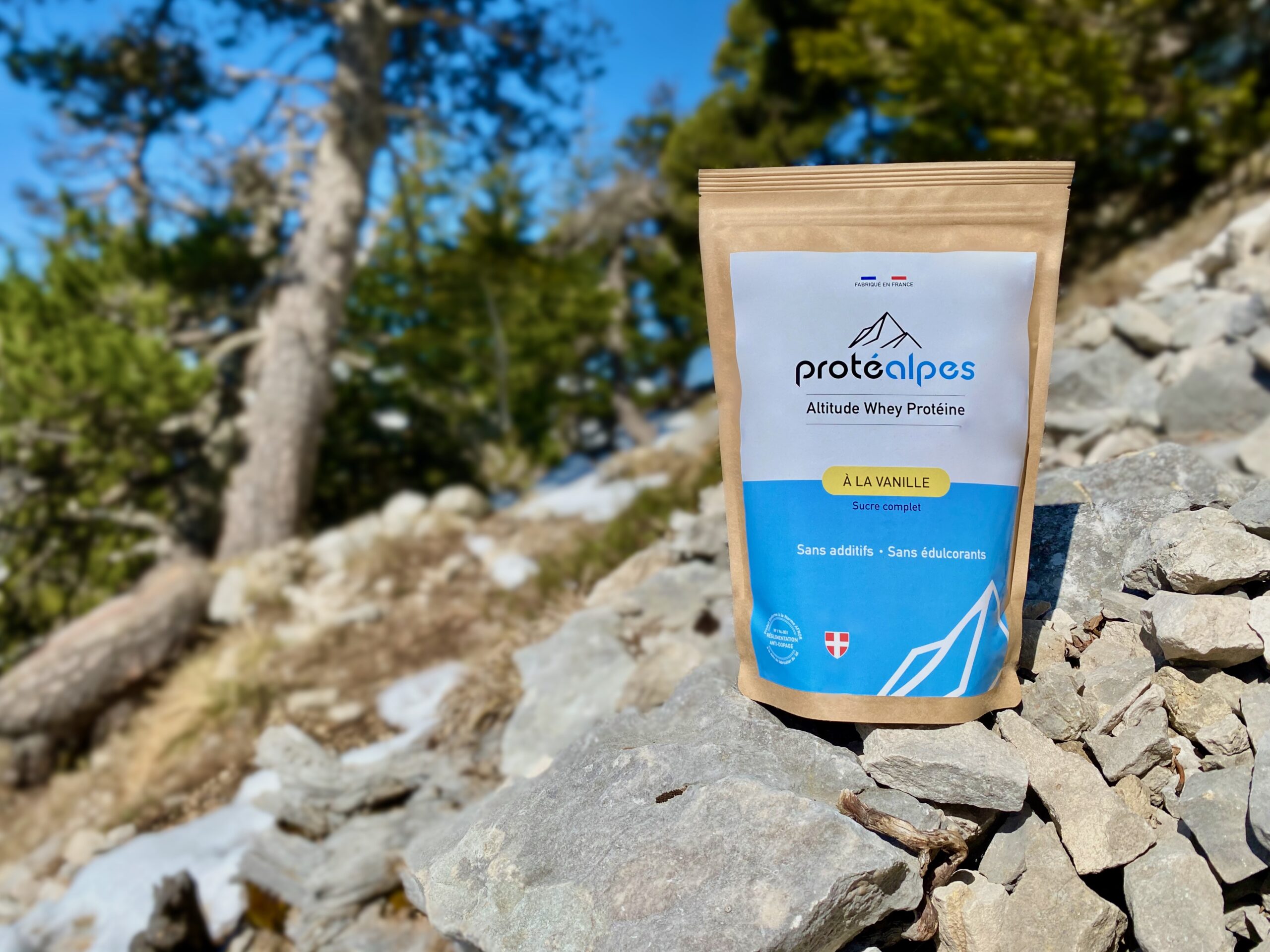Athletes are now convinced of the importance of protein supplementation. Taking protein powder is now considered a safe and effective way to progress.
With this in mind, whey protein is the most popular protein supplement for sports nutrition. But why is it so popular, and why do people choose whey over other protein powders?
Protein powders: products designed to supplement your protein intake
Protein powder consumption is primarily aimed at improving mass gain and muscle recovery. For athletes, however, protein requirements are much higher, requiring an adapted diet plan.
The French food safety agency (ANSES) estimates that a sedentary person should consume 0.83 g/kg/d of protein. For athletes, the ideal protein intake is between 1.3 and 2.2 g/kg/d, depending on your objectives.
However, even if healthy French people (with the exception of senior citizens) have an average intake of 1.2 g/kg/d, which is sufficient for a sedentary individual, whey or high-protein dietary supplements are essential to supplement the athlete's protein intake and optimize the beneficial effects of training.
The dosage of whey protein will of course depend on the athlete's diet, training and state of health. To find out more, read our article on how to take whey protein!
As a general rule, bodybuilding enthusiasts need to consume more protein than endurance athletes. Runners, cyclists and team athletes will typically be satisfied with a protein shaker after training.
For those wishing to lose weight, whey can indeed help you lose weight thanks to its appetite-suppressant properties, but it's not the consumption itself that will help you eliminate body fat.
Why choose whey over other protein powders?
Whey is highly prized for its composition and biochemical characteristics. It is in fact whey, a fraction of cow's milk. To obtain this whitish powder, the whey is mechanically filtered, without the addition of solvents, to remove lactose and lipids. In the end, the spray-dried powder contains around 85% protein, depending on the method used. Raw whey is therefore a 100% natural, unprocessed product.
Unfortunately, the brands that sell it very often add numerous additives, so that the whey sold is no longer all that natural... This is also what has given rise to fears among some consumers about the health effects of whey. But rest assured, if taken correctly and if you don't suffer from any particular conditions , whey consumption has no side effects.
Always opt for certified whey free of additives and sweeteners, so you can be sure of a quality whey, without risking potential problems with repeated consumption of chemical additives. Additives (lecithin, aspartame, sucralose, thickeners, colorants, etc.) are nutritionally useless, and may even be harmful to the consumer's health.
Whey is a dietary supplement with an excellent amino acid profile. It delivers essential amino acids (EAA) as well as branched-chain amino acids (BCAA). The BCAAs - leucine, isoleucine and valine - are amino acids that the body is unable to synthesize, and are the ones most involved in muscle metabolism.
Due to its particular composition, whey protein contains more essential amino acids and BCAAs than salmon or egg, for the same amount of protein. Yet these are the benchmarks for protein intake. Whey protein is therefore an excellent alternative for fine-tuning your nutrition program.
It's also worth noting that whey is a fast-assimilating protein powder, another quality that encourages athletes to consume this product rather than any other. With the price on the market, whey is also the most affordable solution for supplementing your protein intake. Whey has all the qualities needed to be the most popular protein powder.
Does taking whey mean doping?
Contrary to popular belief, whey is a natural substance. It is prepared by filtering a natural liquid to obtain purified whey protein. All that remains is to dry this substance and add various ingredients to give a particular texture or taste to the finished product.
In principle, the process does not involve any enrichment. Protein levels are not artificially manipulated. Whey is therefore not a doping product, since it is simply a natural product reduced to a powder. It does not improve physical performance directly, but optimizes the results of your training sessions, notably via muscle recovery.
Physical effort remains at the heart of your progress. On its own, a protein powder will neither improve muscle recovery nor mass gain. Without physical activity, it can even lead to rapid weight gain, as the body stores protein in the form of fat.
Although studies show that a worrying number of nutritional protein products, even on the European market, are now contaminated with anabolic steroids1, whey consumption should not be equated with doping. These contaminations are criminal and/or accidental, and fortunately do not concern all brands.
Voluntary standards such as the new European standard NF EN 17444 (which replaces the old French standard NF V 94-001) ensure the integrity of marketed products when they comply with this standard.
Why consume whey protein?
Whey is primarily intended for post-exercise supplementation. Consumed after training, this protein powder will help the body repair damaged muscle fibers to make them stronger. The amino acids and BCAAs provided by this nutritional supplement optimize the muscle repair and development phases, and will reduce muscle soreness.
Note that there is a notable difference between endurance and non-endurance sports, particularly when it comes to taking whey on non-training days and the stakes involved in protein intake. And if you want to delve deeper into the subject, take a look at our article on when to take your protein shakes.

In strength sports such as bodybuilding, whey intake significantly increases the volume of muscle fibers. This translates into hypertrophy and mass gain. But to achieve such results, you need to provide your body with around 1.6-2 g/kg/d of protein (including food).
In endurance sports, whey consumption is designed to help you recover from training or an event. Whether for trail running, swimming or team sports, a wheyshaker will enhance muscle recoveryand optimize the effects of training.
In rare cases, whey can be taken outside sport. In this case, whey is used to supplement protein intake in the presence of a diet low in meat and legumes. Whey protein can then be used to prevent protein deficiency.
It can also be beneficial for senior citizens wishing to maintain their muscle mass. Of course, in such cases, it is important to seek the advice of a doctor or health professional, to ensure consumption in the best possible conditions.




















